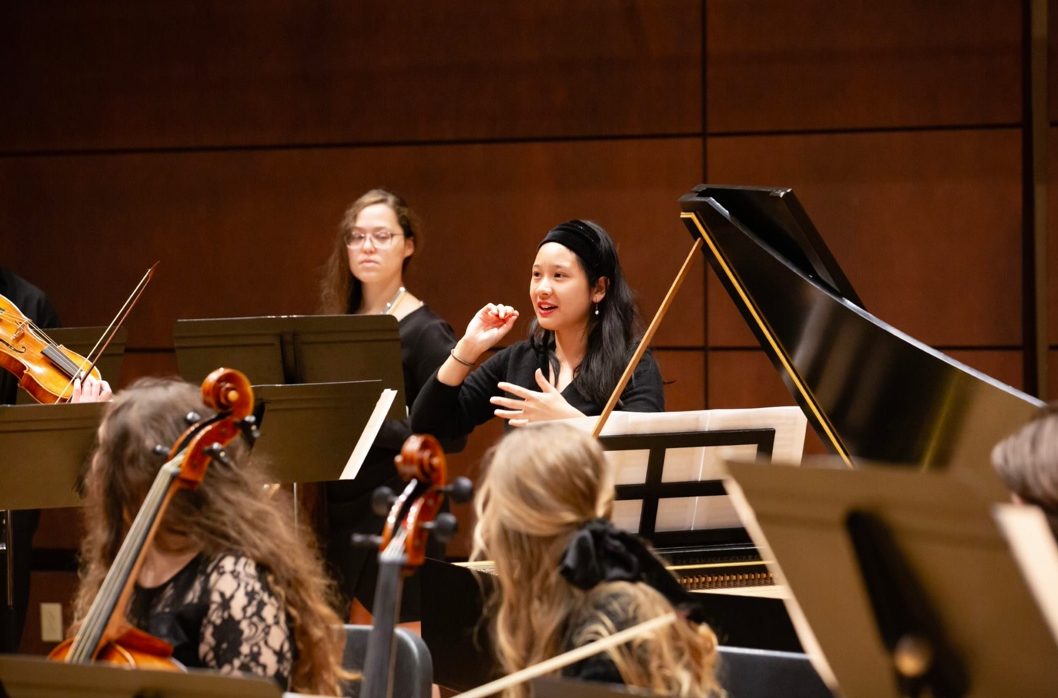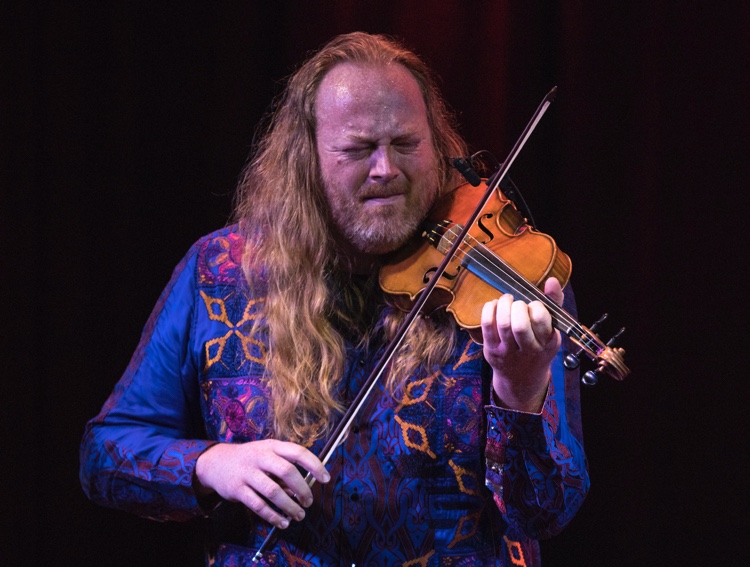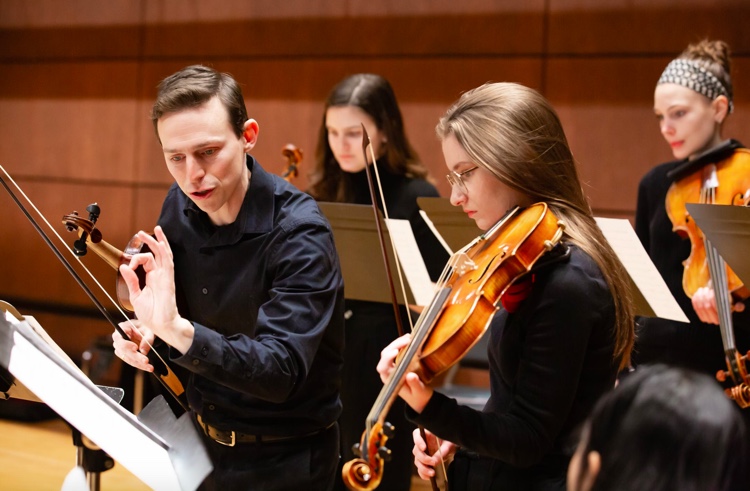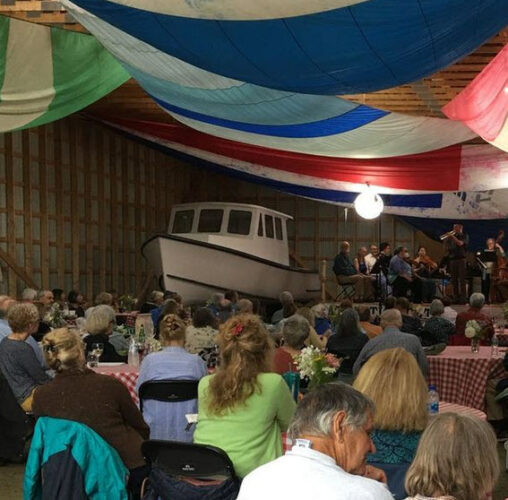by Keith Powers
Published January 27, 2020

(Photo by Joshua Robinson)
Two institutes being unveiled this summer take decidedly different approaches to early-music training.
The Carmel Bach Festival, a staple of early-music performance for 83 years, introduces a unique, focused session for an early-music string quartet. The festival’s Baroque & Classical Institute, conceived and directed by violinist Edwin Huizinga, offers a stipend and travel expenses for the eventual invitees.
“We need it for a couple reasons,” says Carmel Bach executive director Steve Friedlander. “We have our key players only in July, and everyone is already busy. We wanted artists-in-residence to do more for community engagement in the festival season. We have aspirations for these players to become musical ambassadors to Monterey County while the festival is going on.”
Oklahoma City University also introduces a new program this year — a quite different new program. Inspired by the rich OKC early-music scene and the robust collection of period instruments at the university’s Wanda L. Bass School of Music, violinist Benjamin Shute and harpsichordist Anastasia Abu Bakar will co-direct a training institute aimed at singers and instrumentalists.
First-year details for the two-week institute May 31–June 13 are still being finalized, but the program will culminate in a performance of John Blow’s opera Venus and Adonis, semi-staged with Baroque gesture.
“We’re hoping to create an immersive early-music experience,” says Shute, who expects the number of participants to be about 20, or even more intimate. “It’s geared to college age and up, but we’re really just looking for musicians interested in early music — the more interested, the better.”
Carmel Bach Festival Baroque & Classical Academy (July 6–Aug. 1)
One of the most venerable of many venerable early-music gatherings, the Carmel Bach Festival continues for its ninth decade in this spectacular artist retreat on Monterey Peninsula.
“We’re known for our fantastic location — it is Carmel, after all,” says Friedlander. “And it is Bach, after all, as well. But we’re also known for the density of our schedule — 40-50 events in 15 days is a pretty packed calendar.”

Huizinga pitched the idea to Friedlander and the artistic staff at Carmel Bach, including festival music director Paul Goodwin. “It’s sort of a grass-roots thing,” Huizinga says. “It’s the first year, and there are still a ton of things to do. But I’m using my 20 years of education background to come up with the best possible situation.” Huizinga’s own experiences at Québec’s Domaine Forget and the Banff summer institute serve as models for first-year planning.
With only four spots available (deadline for applications and recordings is Feb. 1), both Huizinga and Friedlander remain open to either an existing ensemble or forming a new group.
“There is some sense to having a preformed group,” Friedlander says. “They have good habits, they have their breathing down, simple things like that. But being there when the magic starts can also be a hallmark.”
The quartet will be the musical face for Carmel Bach Festival. “We have a festival orchestra and we have a festival chorale, but we don’t have that thing on the instrumental side,” says Friedlander. “There is a lot of interest among our artistic leadership, especially since we’ve already established the vocal side. It’s really come to the point of forming critical mass.”
The two weeks of training extends far beyond preparing scores for performance. “It will include coffee-time talks with people in the music community — composers, directors, other instrumentalists, our president,” Huizinga says. “I hope we’ll get into real-life situations. I’d like to have a fast-paced interactive lecture program through the month, and something that entertains the possible roads in their careers. To make it not just about performance.
“We’re going to be pairing these young players with their teachers and the best continuo players in the world. And for private lessons as well. But I also want it to be somewhat informal, and ask the candidates what they would like to study.
“I would like it to be a reflection of a modern-day Baroque and Classical career,” Huizinga says. “I’ll be there with players to kind of integrate the audience into their lives, and make it feel like the entire community is helping them grow.”
Oklahoma City University Early Music Summer Institute (May 31–June 13)
At Oklahoma City University, Shute and Abu Bakar have much different plans. First off, the Early Music Summer Institute will be for students, and it charges a modest tuition. Its focus will be determined greatly by the participants.
“We decided to have an audition process, to make sure they are all around the same level,” Abu Bakar says. “I think for the most part they should have some theoretical background, but more importantly be quick learners and sight readers. People don’t have to have any specific experience.
“We hope after auditions that everyone’s learning curve will be similar, so there’s no struggling, and no one’s getting left out. It’s open to young professionals interested in experiencing historical performance for the first time. We might be open to enthusiastic amateurs as well. We’ll have a better idea after we receive the applications.”
Application deadline for voice, bowed and plucked strings, and harpsichord is April 1.

(Photo by Joshua Robinson)
Shute and Bakar met in Europe, and the rich early-music tradition there instilled them with some of the energy it takes to begin an ambitious program like this one.
“There is so much interest and momentum,” Abu Bakar says. “OKC has a lot going for it, and it’s not just early music. For the institute, students will have access to our period instruments. This is a storied collection, including two full quartets of strings, a six-string gamba, a Renaissance lute, a positive organ, two harpsichords. Ben and I are hardly gifted administrators, but it seemed like the right time.”
“It’s a rich early-music enclave here,” Shute concurs. “We have lots of faculty with historical performance experience — Eastman, Indiana, Freiburg, Frankfurt. And we’ve both been influenced by our time in Europe, where the early-music programs are so rich. In fact, early music just penetrates everything that’s done over there — there’s mainstream acceptance.”
A specialist in national styles of basso continuo, Bakar will focus on continuo training. “It took a little bit of thought,” she says. “I spent two years at a master’s learning how to realize continuo, and now I’ll focus those two years into two weeks.”
Conductor Warren Puffer Jones, cellist Michael Unterman, gambist Donna Fournier, and soprano Kelly Holst also join the artistic directors on the institute faculty.
Students “will probably be from this area,” Abu Bakar says. “There’s really nothing like this in the Midwestern area, and there are so many people interested in early music in the region. The fact that we are putting on an opera should help too.
“We’ll draw from this area, and those for whom Tafelmusik or Amherst might be too far, or too expensive, and want to try something different.”
Keith Powers covers music for Gannett, Opera News, and Leonore Overture. Follow @PowersKeith; email to keithmichaelpowers@gmail.com




